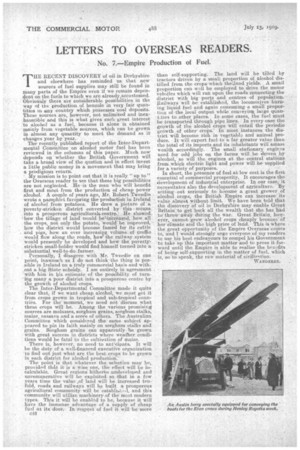LETTERS TO OVERSEAS READERS.
Page 18

If you've noticed an error in this article please click here to report it so we can fix it.
No. 7.—Empire Production of Fuel.
THE RECENT DISCOVERY of oil in Derbyshire and elsewhere has reminded us that new sources of fuel supplies may still be found in many parts of the Empire even it we remain dependent on the fuels to which we are already,aecustomeal.
• Obviously there are considerable possibilities in the way of the production of benzoic in very fair quantities in any country which poesesses coal deposits. These sources are, however, not unlimited and inexhaustible and this is what gives such great interest to alcohol as a fuel, because it alone is obtained mainly from vegetable sources, which can be grown in almost any quantity to meet the demand as it changes year by year.
The recently. published report of the Inter-Departmental Committee on alcohol motor fuel has been reviewed in the columns of this paper. Much now depends on whether the British Government will take a broad view of the qustion and in effect invest a little public money in a movement that may bring a prodigious return.
y mission is to point out that it is really "up to" the Overseas reader to see that these big possibilities are not neglected. He is the man who will benefit first and most from the production of cheap power alcohol. A couple of years ago, Mr. Robert Tweedie wrote a pamphlet favouring the -production in Ireland of alcohol from potatoes. He drew a picture Of 'a poverty-stricken district converted by thismeans into a prosperous egriculturah; centre. He showed. how the tillage of land vmuld loelincreased, how_ all the crops, not only the potato, wouldbe improved, how the district would become famed for its cattle
and pigs, how an ever increasing volume of traffic, would flow along the roads, how the railway system
would presently be developed and how the povertystricken small-holder would find himself turned into a substantial well-to-do farmer.
• Personally, I disagree with Mr. Tweedie on one point, inasmuch as I do not thinicthe thing is pos sible in Ireland OD a truly commercial basis and without a big State subsidy. I am entirely in agreement with him in is estimate of the possibility of :turning many a poor district into a prosperous centre by the growth of alcohol crops. The Inter-Departmental Committee made it quite clear that, if we want cheap alcohol, we must get it from crops grown in tropical and sub-tropical coun tries. For the moment, we need not discuss what these crops will be. Among the various promising sources are molasses, sorghum grains, sorghum stalks, maize, cassava and a score of others. The Australian Committee which considered the same subject ap peared to pin its faith mainly on sorghum stalks and grains. Sorghum grains can apparently be grown with great success in districts where weather conditions would be fatal to the cultivation of maize.
There is, however, no need to anticipate. It will be the duty of. a well-financed executive organization to find out just what are the best crops to be grown in each district for alcohol production. The point is that whatever the selection may be, provided thint it is a wise one, the effect will be in calculable. Great regions hitherto :undeveloped and unremunerative will be exploited so that in a few years time the value of land will be increased ten fold, roads and railways will be built a prosperous agricultural -community will be establisla ,l, and this community will utilize machinery of the most modern types. This it will be enabled to be, because it will have the immense advantage of a supply of cheap fuel at its dem% In respect of fuel it, will be more crla
than self-supporting. The land will be tilled by tractors driven by a small proportion of alcohol distilled from the crops, which the;',,land yields. A small proportion can well be employed to drive the motor vehieles which will run upon the roads connecting the distriet with big' ports and :centres 'of population.Railways will be established, the locomotives burning liquid fuel and again consuming a small proportion on the local output while conveying Liege quartt,tieS to _other places. In some cases, the fuel mnst be transported through pipe lines. In every ease the growth of the alcohol crops will entail the periodic• growth of other crops. " In most instances -the district will become rich in vegetable and animal Produce. It will export fuel to a far greater value than the total of its imports and its inhabitants will arnass. wealth accordingly. The small stationary engines used for odd jobs on the farms will be driven by alcohol, so will the engines at the central stations from which electric light and power will be supplied for a variety of purposes. In short, the presence of fuel at low cost is the first essential of commercial prosperity. It encourages the development of industrial enterprise. In our case, it necessitates also the development of agriculture. By setting-out seriously to. become a, great grower of alcohol. crops, the British Empire can increaseits value almost Fithout limit, We have been told that the 'discovery of oil in Derbyshire may enable Great Britain" to get back all the wealth that she has had to throwawayduring the war. Great Britain, however, cannot grow alcohol crops cheaply because of her climate and the high price of latid. This is where the great opportunity of the Empire Overseas'eornes in, and I would strongly urge everyone of my readers to use his best endeavours to compel his Government -to take up this impoitant matter and to press it forward until the Empire is able to realize the benefits of being self-supporting in -the matter of fuel, which is, so to speak, the raw material of eivilizetion, WANDERER.






















